A special election was held in Maryland's 3rd congressional district to fill a vacancy caused by the resignation of William Pinkney (P) due to questions of ineligibility due to his residence [1]
| Elections in Maryland |
|---|
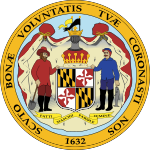 |
A special election was held in Maryland's 3rd congressional district to fill a vacancy caused by the resignation of William Pinkney (P) due to questions of ineligibility due to his residence [1]
| Candidate | Party | Votes [2] | Percent |
|---|---|---|---|
| John Francis Mercer | Anti-Administration | 313 | 100% |
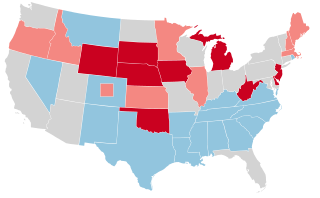
The 1942 United States Senate elections were held November 3, 1942, midway through Franklin D. Roosevelt's third term as president. The 32 seats of Class 2 were contested in regular elections, and two special elections were held to fill vacancies.

The 1938 United States Senate elections occurred in the middle of Franklin D. Roosevelt's second term. The 32 seats of Class 3 were contested in regular elections, and special elections were held to fill vacancies. The Republicans gained eight seats from the Democrats, though this occurred after multiple Democratic gains since the 1932 election, leading to the Democrats retaining a commanding lead over the Republicans with more than two-thirds of the legislative chamber.

The 1936 United States Senate elections coincided with the reelection of President Franklin D. Roosevelt. The 32 seats of Class 2 were contested in regular elections, and special elections were held to fill vacancies. The Great Depression continued and voters backed progressive candidates favoring Roosevelt's New Deal in races across the country. The Democrats gained 5 net seats during the election, and in combination with Democratic and Farmer–Labor interim appointments and the defection of George W. Norris from the Republican Party to become independent, the Republicans were reduced to 16 seats. Democrats gained a further two seats due to mid-term vacancies. The Democrats' 77 seats and their 62-seat majority remain their largest in history.

The 1934 United States Senate elections were held in the middle of Democratic President Franklin D. Roosevelt's first term. The 32 seats of Class 1 were contested in regular elections, and special elections were held to fill vacancies. During the Great Depression, voters strongly backed Roosevelt's New Deal and his allies in the Senate, with Democrats picking up a net of nine seats, giving them a supermajority. Republicans later lost three more seats due to mid-term vacancies ; however, a Democrat in Iowa died and the seat remained vacant until the next election. The Democrats entered the next election with a 70-22-2-1 majority.

The 1932 United States Senate elections coincided with Democrat Franklin D. Roosevelt's landslide victory over incumbent Herbert Hoover in the presidential election. The 32 seats of Class 3 were contested in regular elections, and special elections were held to fill vacancies.

The 1926 United States Senate elections were elections for the United States Senate that occurred in the middle of Republican President Calvin Coolidge's second term. The 32 seats of Class 3 were contested in regular elections, and special elections were held to fill vacancies. The Republican majority was reduced by seven seats.

The 1998 United States House of Representatives elections were held on November 3, 1998, to elect U.S. Representatives to serve in the 106th United States Congress. They were part of the midterm elections held during President Bill Clinton's second term. They were a major disappointment for the Republicans, who were expecting to gain seats due to the embarrassment Clinton suffered during the Monica Lewinsky scandal and the "six-year itch" effect observed in most second-term midterm elections. However, the Republicans lost five seats to the Democrats, although they retained a narrow majority in the House. A wave of Republican discontent with Speaker Newt Gingrich prompted him to resign shortly after the election; he was replaced by Congressman Dennis Hastert of Illinois.

The 1958 United States House of Representatives elections was an election for the United States House of Representatives to elect members to serve in the 86th United States Congress. They were held for the most part on November 4, 1958, in the middle of Dwight Eisenhower's second presidential term, while Maine held theirs on September 8. There were 436 seats during these elections: 435 from the reapportionment in accordance with the 1950 census, and one seat for Alaska, the new state that would officially join the union on January 3, 1959.

The 1888–89 United States Senate elections were held on various dates in various states, coinciding with Benjamin Harrison's victory over incumbent President Grover Cleveland. As these U.S. Senate elections were prior to the ratification of the Seventeenth Amendment in 1913, senators were chosen by state legislatures. Senators were elected over a wide range of time throughout 1888 and 1889, and a seat may have been filled months late or remained vacant due to legislative deadlock. In these elections, terms were up for the senators in Class 2.
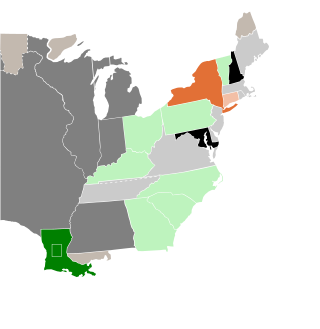
The 1812–13 United States Senate elections were held on various dates in various states, coinciding with President James Madison's re-election. As these U.S. Senate elections were prior to the ratification of the Seventeenth Amendment in 1913, senators were chosen by state legislatures. Senators were elected over a wide range of time throughout 1812 and 1813, and a seat may have been filled months late or remained vacant due to legislative deadlock. In these elections, terms were up for the senators in Class 3.
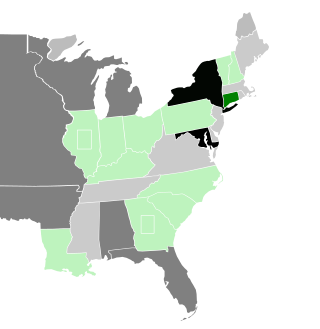
The 1818–19 United States Senate elections were held on various dates in various states. As these U.S. Senate elections were prior to the ratification of the Seventeenth Amendment in 1913, senators were chosen by state legislatures. Senators were elected over a wide range of time throughout 1818 and 1819, and a seat may have been filled months late or remained vacant due to legislative deadlock. In these elections, terms were up for the senators in Class 3.
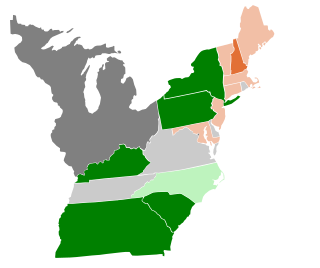
The 1800–01 United States Senate elections were held on various dates in various states, coinciding with Thomas Jefferson being elected to the White House. As these U.S. Senate elections were prior to the ratification of the Seventeenth Amendment in 1913, senators were chosen by state legislatures. Senators were elected over a wide range of time throughout 1800 and 1801, and a seat may have been filled months late or remained vacant due to legislative deadlock. In these elections, terms were up for the senators in Class 3.

The 1836–37 United States Senate elections were held on various dates in various states. As these U.S. Senate elections were prior to the ratification of the Seventeenth Amendment in 1913, senators were chosen by state legislatures. Senators were elected over a wide range of time throughout 1836 and 1837, and a seat may have been filled months late or remained vacant due to legislative deadlock. In these elections, terms were up for the senators in Class 3.

The 1834–35 United States Senate elections were held on various dates in various states. As these U.S. Senate elections were prior to the ratification of the Seventeenth Amendment in 1913, senators were chosen by state legislatures. Senators were elected over a wide range of time throughout 1834 and 1835, and a seat may have been filled months late or remained vacant due to legislative deadlock. In these elections, terms were up for the senators in Class 2.

The 1830–31 United States Senate elections were held on various dates in various states. As these U.S. Senate elections were prior to the ratification of the Seventeenth Amendment in 1913, senators were chosen by state legislatures. Senators were elected over a wide range of time throughout 1830 and 1831, and a seat may have been filled months late or remained vacant due to legislative deadlock. In these elections, terms were up for the senators in Class 3.

The 1824–25 United States Senate Elections were held on various dates in various states. As these U.S. Senate elections were prior to the ratification of the Seventeenth Amendment in 1913, senators were chosen by state legislatures. Senators were elected over a wide range of time throughout 1824 and 1825, and a seat may have been filled months late or remained vacant due to legislative deadlock. In these elections, terms were up for the senators in Class 3.

These six off-year races featured special elections to the 113th United States Congress to fill vacancies due to resignations in the United States House of Representatives. Two were due to Congressmen taking seats in the United States Senate, one resigned to take jobs in the private sector, one resigned to take a job in the public sector, and one resigned due to an impending federal indictment regarding misuse of campaign funds.

The 2020 Portland City Commission elections were held on May 19, 2020 and November 3, 2020 with a special election on August 11, 2020.

The 2022 Philadelphia City Council special elections were planned special elections in 2022. The reason for the special elections was at least five resignations from the Philadelphia City Council.

The 2024 United States House of Representatives elections will be held on November 5, 2024, as part of the 2024 United States elections, to elect representatives from all 435 congressional districts across each of the 50 U.S. states, as well as 6 non-voting delegates from the District of Columbia and the inhabited U.S. territories to the United States House of Representatives. Special elections have also been held on various dates in 2024. Numerous other federal, state, and local elections, including the U.S. presidential election and elections to the Senate, will also be held on this date. The winners of this election will serve in the 119th United States Congress, with seats apportioned among the states based on the 2020 United States census.